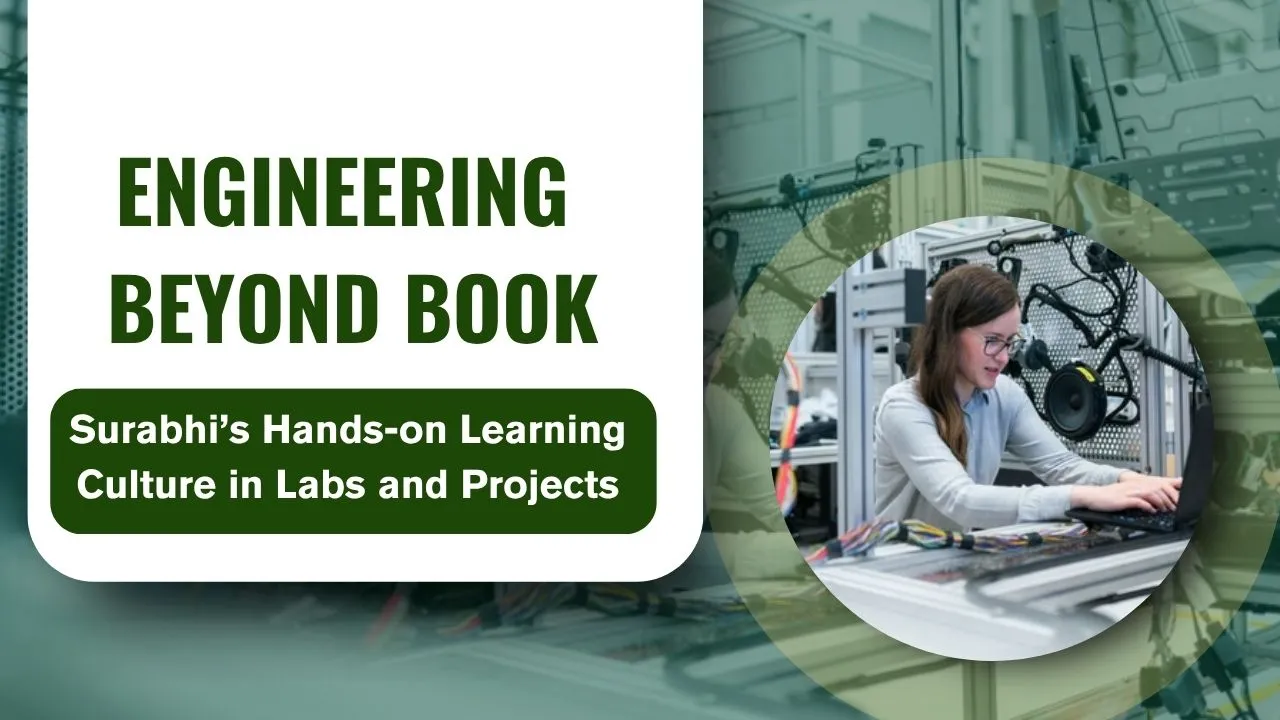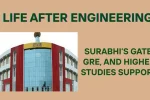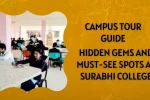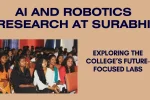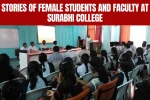Engineering Beyond Books at Surabhi: Engineering Beyond Books is not just a phrase at Surabhi Institute; it’s a way of thinking. Here, students actively design, build, and test real-world solutions. Forget long lectures—it’s about rolling up sleeves and making things happen. The result? Confident engineers ready for challenges in innovation, teamwork, and problem-solving.
In this article, we dive into how Surabhi weaves practical learning throughout every engineering department. We’ll explore lab work, collaborative projects, faculty mentorship, and real industry links. You’ll see why this hands-on culture sets graduates apart.
Engineering Beyond Books at Surabhi: A 100–120 Word Spotlight
Engineering Beyond Books is more than a tagline—it’s the heartbeat of Surabhi’s engineering spirit. Across every department, theory meets hands-on practice in labs, workshops, and live projects. Students program microcontrollers, fabricate parts in the mechanical workshop, analyze real civil structures, and build circuit boards—often as part of interdisciplinary teams. This immersive environment uses active learning, project-based learning, and experiential labs to help students apply classroom ideas in the real world. Whether it’s building a smart car or testing renewable energy tech, Surabhi engineers learn by doing, experimenting, and iterating. This practical approach fosters creativity, critical thinking, and confidence.
Overview of Practical Learning at Surabhi
| Department | Practical Tools & Labs | Example Projects |
| Electrical Engineering | Circuit benches, PCB design tools, signal analyzers | Smart lighting systems, IoT sensors |
| Mechanical Engineering | CNC machines, material testing rigs, CAD/CAM stations | Mini electric vehicles, robotic arms |
| Computer Engineering | Programming labs, AI toolkits, network test beds | Voice assistants, data analytics platforms |
| Civil Engineering | Soil testing kits, surveying equipment, concrete lab | Model bridges, water filtration systems |
Core Engineering Labs for All Departments
Surabhi’s labs are where concepts come alive. Each department has state-of-the-art spaces for mechanical, electrical, civil, and software workshops. Students engage in weekly hands-on lab sessions tied directly to their lectures. In mechanical engineering, they use CNC machines and 3D printers to make parts. Electrical engineers design and test printed circuit boards. Civil engineering students learn soil properties and build miniature structures. In computer engineering labs, students code, debug, and analyze algorithms on real hardware. This integration of theoretical classes with lab work sharpens analytical thinking and enhances retention of learning.
Interdisciplinary Project-Based Learning
To encourage teamwork and multifaceted thinking, Surabhi promotes interdisciplinary projects. Students from different majors collaborate to design and execute complex systems. These projects follow active learning, as they include planning, prototyping, testing, and refining. For instance:
- Smart Home Automation trios build sensor-based systems, write mobile apps, and program microcontrollers.
- Eco-Vehicle Challenge teams design a small electric vehicle, optimizing mechanical design, electronics, and power systems.
- Drone Navigation System teams from mechanical, electrical, and computer backgrounds work together on autonomous UAVs with obstacle detection.
These projects foster communication, leadership, and system-level thinking, preparing students for real world engineering roles.
Industry-Sponsored Workshops and Labs
Surabhi partners with industry leaders to offer workshops in CAD design, IoT prototyping, renewable energy systems, and PCB fabrication. These hands-on experiences involve students assembling circuits, programming embedded systems, and testing prototypes under expert guidance. These collaborations bridge the gap between academic learning and industry needs. Students graduate with in-demand skills, making them job-ready and confident in employing professional tools.
Department-Specific Practical Modules
Every department integrates practical modules tailored to its field:
- Electrical Engineering: Students analyze waveforms, construct power electronics circuits, and explore signal processing.
- Mechanical Engineering: Students use lathe, milling machines, and CAD/CAM for designing mechanical parts.
- Computer Engineering: Daily coding labs, data structure assignments, algorithm testing on real servers.
- Civil Engineering: Students conduct soil and concrete tests, learn surveying in field trips, plus model load-bearing structures.
These modules build technical skill, complement theory, and assure students that they can put knowledge into action.
Innovation and Incubation Hub
Surabhi’s Innovation Hub gives students 24/7 access to prototyping tools—3D printers, laser cutters, soldering stations. This resource-rich environment encourages students to pursue self-driven ideas, pitch them for funding, and bring prototypes to life. Regular showcases let project teams present to peers, faculty, and industry mentors. Many ideas mature into internships or startup ventures, laying a path for entrepreneurial growth.
Assessment Through Demonstration
At Surabhi, evaluation goes beyond the written exam. Students present functioning prototypes, explain design decisions, and undergo peer review. Demonstration-based assessment reinforces presentation skills and practical ability. This approach ensures students don’t just memorize—they understand, apply, and defend their work.
Active Faculty Mentorship
Faculty at Surabhi wear multiple hats—mentor, coach, and facilitator. They guide students through lab experiments, troubleshoot design problems, and support creative exploration. Mentorship is personal: professors host office hours in labs, encourage iterative testing, and foster a safe environment for failure and experimentation. This supportive culture builds confidence and nurtures independent thinking.
Industry Internships and Field Visits
Surabhi arranges regular visits to companies, research centers, and construction sites. These field trips introduce students to manufacturing lines, testing labs, and engineering teams in action. Internships place students into real roles, working on tasks such as project planning, design optimization, or data analysis. This tangible industry exposure helps students align with workplace standards and expectations.
Student-Led Technical Clubs
Clubs such as the Robotics Club, Auto Club, Coding Society, and Electronics Forum teach peer-mentorship and collaboration. Regular internal competitions, coding challenges, and hackathons reinforce lab learning. Students teach sessions, share knowledge, and spark a passion for lifelong learning—an essential trait in engineering professions.
Annual Tech Festival
The yearly tech fest is a celebration of hands-on learning. Robotics competitions, bridge-building contests, hackathons, and cybersecurity challenges inspire creativity under pressure. Each team applies skills from labs and projects, targeting tangible outcomes. Industry judges and visitors offer feedback, networking, and potential opportunities. The event emphasizes innovation, teamwork, and agile thinking.
Two Highlighted Practical Integration Areas
- Lab + Theory in Sync
Weekly laboratory sessions are directly tied to lecture content across all departments, so students immediately test and internalize concepts learned in class. - Project-Based Learning with Support
Interdisciplinary teams take on real-world challenges, fully supported by the Innovation Hub, faculty mentorship, and industry guidance.
FAQs
1. What is practical learning at Surabhi?
It means learning by building and doing—assembling circuits, coding projects, testing materials—so you truly grasp engineering concepts.
2. How are projects graded?
Grades come from working demonstrations, presentations, and peer feedback—showing you can build and explain your design.
3. Can students start their own projects?
Absolutely. The Innovation Hub supports student ideas, from pitching to prototyping, often leading to funded projects or startups.
4. Do all majors get this hands-on approach?
Yes—Electrical, Mechanical, Computer, and Civil Engineering all include lab work, workshops, and real project experience.
5. What industry exposure is available?
Students attend field visits, take sponsored workshops, and complete paid internships—building professional skills before graduation.
Final Thought
Engineering Beyond Books at Surabhi transforms students into creative, confident problem-solvers. Through labs, teams, mentorship, and real-world exposure, graduates leave ready to innovate. If you’re inspired by this hands-on learning approach, comment, share your thoughts, or get involved. Discover more on our tech programs, join our maker network, and explore your own engineering potential. Let’s build the future together—start your journey now!

